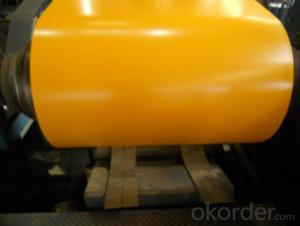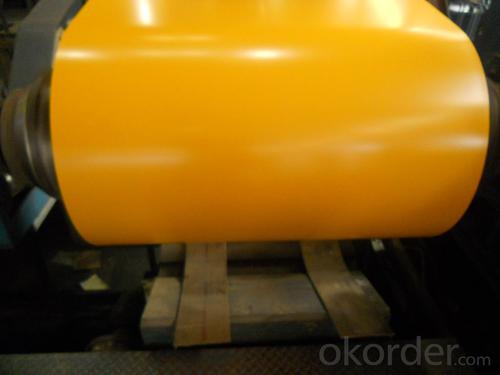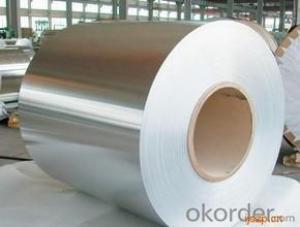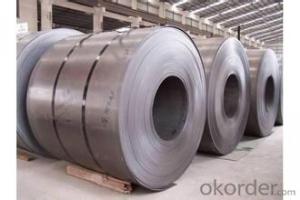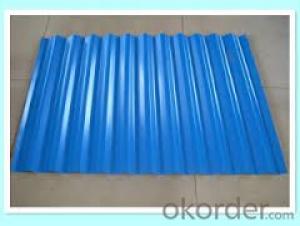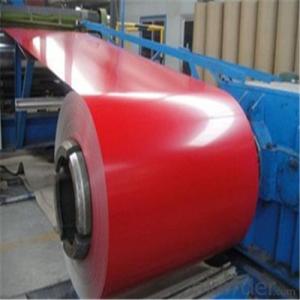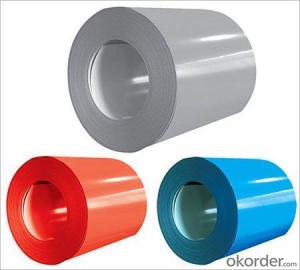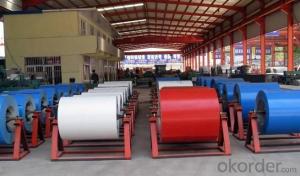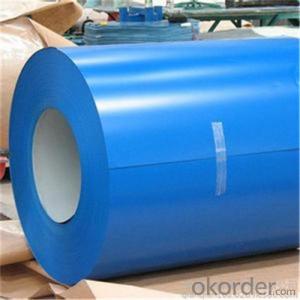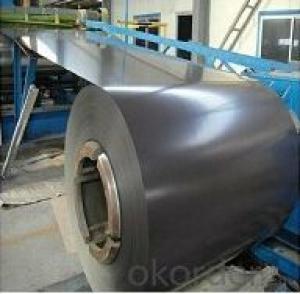Prepainted Galvanized Steel
- Loading Port:
- China Main Port
- Payment Terms:
- TT OR LC
- Min Order Qty:
- -
- Supply Capability:
- -
OKorder Service Pledge
OKorder Financial Service
You Might Also Like
Product Description:
Prepainted Galvanized Steel
With galvanized steel as base metal, after pretreatment (degrease and chemical treatment) and liquid dope with several layers of color, then after firing and cooling, finally the plate steel is called pre-painted galvanized steel. Pre-painted galvanized steel is good capable of decoration, molding, corrosion resistance. It generally displays superior workability, durability and weather resistance.
Brand Name: HBSTEEL
Specifications OfPrepainted Galvanized Steel
Thickness 0.20-1.2mm (BMT) Width 600-1250mm |
Zinc Coating 100-275g/m2 |
Color According to RAL color fan or as per request |
Internal Diameter 508mm or 610mm |
Coil Weight 3-6MT |
Quality Commercial and structural quality |
Paint Polyester paint for topside, epoxy for reverse |
Standard JIS G 3312, ASTM A755M, EN 10169 |
Base Steel Grade SGCC,SGCD,DX51D+Z,DX52D+Z;S200GD,S220GD,S280GD,S350GD,CS,FS,SS |
Chemical Composition Of Prepainted Galvanized Steel
C | Si | Mn | P |
0.04-0.06% | 0.01-0.03% | 0.18-0.22% | 0.014-0.016% |
Technical Data Of Prepainted Galvanized Steel
Yield Strength | (Mpa) 280-320 |
Tensile Strength | (Mpa) 340-390 |
Elongation | 20%-30% |
Reverse Impact | 9J |
T-bending | ≥2T |
Pencil Hardness | ≥2H |
Duration Of Salt Spray Test | 500 H |
Bending At 180 Degree | No crack, purling and fraction |
Applications OfPrepainted Galvanized Steel
It can be widely used in transportation, light industry, civil usage and farming. It is also the perfect building material in construction for making steel roofing,insulation panel, corrugate sheet, facade wall,shutters,T-bar and home appliance.
- Q: I am wondering what the highest quality steel is used in handgun production.
- The first answer was correct. The type of steel used in most blued handguns is the highest. After that I prefer stainless. Then the Scandium framed pistols.
- Q: How are steel coils used in the production of construction machinery?
- Steel coils are used in the production of construction machinery as they provide the necessary strength and durability required for heavy-duty equipment. These coils are shaped and formed into various components such as frames, chassis, and structural parts, ensuring the machinery can withstand the rigorous demands of construction sites. The versatility and malleability of steel coils allow manufacturers to create complex and intricate designs, resulting in reliable and robust construction machinery.
- Q: I was cutting a sheet of steel with an angle grinder when suddenly the rate at which the blade was cutting slowed way down. I tried a few different things, and turned off the tool and looked at the blade. It didn't look damaged, but it definitely was not cutting as quickly. I thought either I had hit a harder section of steel (is that possible? It looked pretty uniform) or the blade had lost it's abrasive quality or something. Also, before this happened I had accidentally cut into the wooden sawhorse that was holding up the steel sheet, but I've done that before with no problem. After a short while the problem fixed itself and the rate of cutting went back to a fast normal. Anyone know why this happened?
- Your blade was overheated. Change it into diamond blade shall do.
- Q: What are the common tests performed on steel coils?
- Common tests performed on steel coils include visual inspection, dimensional measurement, tensile strength testing, hardness testing, surface finish evaluation, and coating thickness measurement. Additionally, other specialized tests like bend testing, impact testing, and corrosion resistance testing may also be performed depending on the specific requirements and application of the steel coils.
- Q: What are the common methods of forming steel coils?
- The common methods of forming steel coils include hot rolling, cold rolling, and strip casting.
- Q: If you combine stainless steel with gold, does that make stainless gold?
- Stainless steel, I believe, was an actual trade name of a british cutlery company's knives, once the ability to create iron-chromium alloys was mastered. Stainless steel's main alloying agent that prevents it from rusting, is Chromium. The Chromium in the steel creates an protective layer (not unlike rust), which acts as a protectant for the rust-prone iron...keeping real rust away. I am no metallurgist, but I have not heard of gold being used as an alloying agent in common steels. I'm not even sure they would mix. Not all metals can be stirred together successfully. Even if gold could be used as an alloying agent for steel, it would need to be in such a small percentage, you would not end up with a metal that was gold in appearance...so it would still look like steel of some sort. The funny part is, gold is already stainless, and does not tarnish or rust as it is.
- Q: what are the properties that can strengthen the steel to withstand earhquake?
- Earth quakes are due to the result of the earth underneath moving. The earth has so many layers of earths called plates placed one over the other for so many millions of years. When these plates move because of stress and strain on the crust of the earth then the structures built over them collapses. So it need not to be steel or concrete which can withstand these stress and strains. Actually strength is not going to help. In Japan originally they built buildings with wood and made them light so that when earth quake strikes the impact is very less. A building has to withstand the shocks by having a spring action and should be spreading out the stress away from the building and act as a shock absorber.
- Q: How do steel coils contribute to the energy efficiency of buildings?
- Steel coils contribute to the energy efficiency of buildings in several ways. Firstly, steel coils are often used in the construction of roofs and walls, providing a durable and well-insulated structure that helps to minimize heat transfer and reduce energy loss. Additionally, steel coils can be coated with reflective materials, such as cool roof coatings, which help to reflect the sun's heat and reduce the cooling load on the building. Lastly, steel coils are also commonly used in the manufacturing of HVAC systems, ensuring efficient heating and cooling operations, further enhancing the energy efficiency of buildings.
- Q: What are the characteristics of hot-rolled steel coils and cold rolled steel coils? What loading and unloading tools should be used? What items should be paid attention to?
- General handling steel rolls are used for driving. Forklift trucks are OK, but a larger fork truck, usually cold rolled, weighs less than 15T. The hot rolled coil is below 30T.
- Q: What industries use steel coils?
- Several industries use steel coils, including automotive, construction, energy, manufacturing, and transportation.
Send your message to us
Prepainted Galvanized Steel
- Loading Port:
- China Main Port
- Payment Terms:
- TT OR LC
- Min Order Qty:
- -
- Supply Capability:
- -
OKorder Service Pledge
OKorder Financial Service
Similar products
Hot products
Hot Searches
Related keywords
